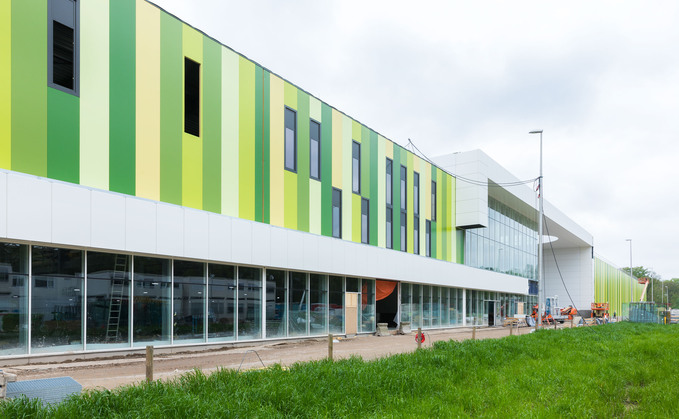
Brainport Industries Campus, Netherlands
Partner Insight: The UK has made impressive strides in embedding sustainability into the built environment. But as we face mounting climate and social challenges, it’s time to ask: what can we learn from our peers around the world?
One of the advantages of working for a multi-national organisation is gaining an international perspective on resolving common problems. Equans operates in 20 countries globally – so we have the privilege of learning from colleagues tackling similar challenges, often with very different tools, policies or market conditions.
As someone responsible for sustainability and procurement in the UK and Ireland, I'm always asking: How can we bring the best of what works elsewhere to accelerate progress here?
Here are key considerations I believe UK organisations could reflect on:
1. Designing with decarbonisation and digitalisation in mind
Our most difficult sustainability challenge remains in tackling the climate emergency, and there are many international references that combine best-in-class solutions with low-carbon tech, energy efficiency and digitalisation. At the Brainport Industries Campus in the Netherlands, we operate a high-tech innovation centre that runs entirely on decarbonised energy. Not only is 20 per cent of its electricity produced on site, but the campus' heating and cooling systems are powered by aquifer thermal energy storage, delivering efficiency and resilience year-round.
The campus, a flagship project of our specialist brand, Carbon Shift, has benefitted from the consideration of sustainability measures at the start of the build – and its continued, efficient performance is underpinned by insights through digital tools.
Low carbon design is not new in the UK, but often the digital integration that supports long-term performance is bolted on later. By embedding lifecycle energy modelling and smart controls from day one, projects like Brainport demonstrate what can be possible when digitalisation and decarbonisation go hand-in-hand.
2. Building a full range of sustainability principles into every project
In Austria, the refurbishment of the Rosewood Schloss Fuschl hotel is a great example of sustainability aligned with place. We installed a bespoke heat pump system to cool water before returning it to a sensitive lake, preserving local biodiversity. The heating system runs on biomass sourced within 100km, supporting both decarbonisation and the local economy. By including conscious design choices, the project looks beyond carbon metrics to include ecosystems protection, working in harmony with the local environment.
In the UK, as biodiversity net gain requirements take effect, we have an opportunity to shift from compliance-driven green infrastructure to solutions that genuinely enhance local ecosystems.
3. Alignment of policy and funding with technology to accelerate adoption
The UK has made commendable strides with large-scale retrofit and decarbonisation through supportive government policies, such as the Warm Homes: Social Housing Fund (WH:SHF). Equans has supported clients to secure and deliver £320m in WH:SHF government funding to date. This has enabled the retrofit of thousands of homes across the country, including a flagship project in Birmingham where 2,000 council homes have undergone transformation - cutting carbon by 2,500 tonnes per year and helping residents save up to £1,500 annually on energy bills. This project is tackling fuel poverty and climate change in tandem in a city where more than 21 per cent of households are in fuel poverty - well above the national average.
While this example demonstrates the UK's leadership in deploying retrofit at scale, we can still look internationally for inspiration on how policy can further accelerate low-carbon adoption. Addressing the "spark gap" - the cost difference between electricity and gas - could unlock faster uptake of electric heating solutions. In countries like France and Sweden, reallocation of levies from electricity to gas, or to general taxation, has helped to close this gap, making electric solutions more accessible and financially viable for homeowners and tenants alike.
4. Utilising supply chain and partnerships for increased sustainability impact
Sustainability at scale requires collaboration - and our supply chain partners plays a vital role in helping us achieve greater environmental and social value. In France, we have developed a comprehensive cable recycling programme with Nexans, recovering €171,000 in value and recycling 78 tonnes of material over three years. This is just one example of how targeted partnerships can unlock circular value in complex systems.
In the UK, we have gone further by co-creating a Social Value Community Pot with several of our high-spend suppliers, including Travis Perkins, Jewsons, Speedy, and Dulux. Linked to contract spend, this pot provides cash, materials and volunteer hours which our social value teams use to deliver community projects. From supporting veteran employment through training hubs with Stepway, to co-building pavilions for youth engagement with Beyond the Box - our supply chain partners are enabling real, measurable outcomes.
This is supported by our UK Sustainable Procurement Charter, which embeds environmental and social impact criteria across purchasing, and the development of our Group-wide supply chain engagement strategy, which will further help us collaborate on sustainability performance.
5. From silos to systems: Unlocking scalable sustainability
Here in the UK, we're delivering the nation's first net zero neighbourhood in Dudley. Through a partnership with the West Midlands Combined Authority, around 300 homes are being retrofitted with solar panels, batteries, low-carbon heat and insulation - creating a replicable model for seven local authorities.
The key to the project's success is systems thinking - not just looking at individual buildings, but the infrastructure, behaviours and social outcomes that sit around them. It's this kind of integrated approach that will define the future of sustainability in the built environment.
Every region has its own context - politically, economically, and culturally. But we're united by the same challenge: how do we accelerate change, and make it sustainable?
A recent Equans-commissioned OpinionWay survey of 1,300+ industrial leaders across five European countries found that while 94 per cent of UK respondents believe decarbonisation aligns with their business goals, 39 per cent cite complexity as a key barrier, and 65 per cent feel political rhetoric is slowing progress. Yet despite this, the research shows UK firms are leading: more than half have already rolled out concrete measures, and 94 per cent have formalised their commitments in an official framework - far above the European average.
With the right combination of leadership conviction, supportive policy, financing, and accessible technological solutions, all types of organisations can advance their sustainability performance.
Many of the answers already exist – and by sharing knowledge across borders, we can better recognise some of the barriers and deliver faster, more inclusive progress both for people and the planet. Let's keep looking outward, to learn, and to bring the best of what we find back home, and support each other by sharing our leadership in sustainability. Together, through cross-border collaboration and shared innovation, we can accelerate the transition to a more sustainable, inclusive built environment - at home and abroad.
Key international takeaways to support UK sustainability projects:
- Embed digitalisation from day one to support long-term decarbonisation.
- Build the full range of sustainability principles into every project.
- Align policy, funding, and technology to accelerate adoption.
- Use supply chain partnerships to scale social and environmental value.
- Think in systems, not silos, to deliver replicable transformation.
Amelle Mestari is sustainability & procurement director at Equans UK & Ireland, leading cross-sector initiatives to embed environmental and social value across the built environment.
This article is sponsored by Equans UK & Ireland.







